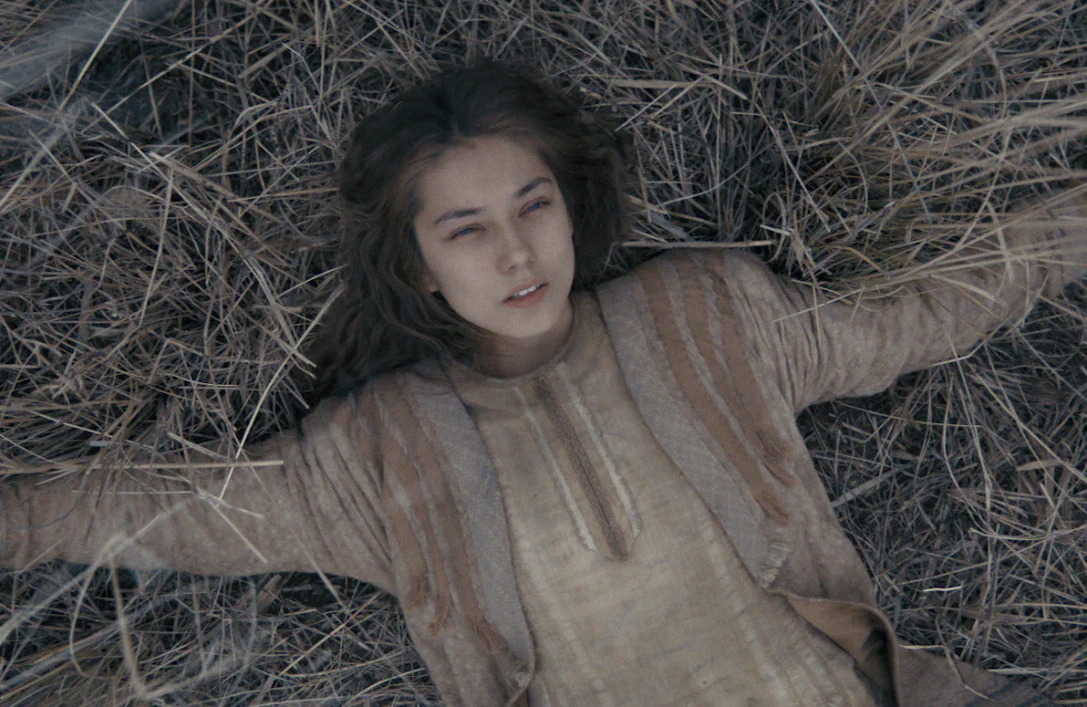This isn't a mere ranking, nor is it a in any random order. No, what we've crafted here is more like a treasure trove of cinematic gems handpicked just for you.
This is the second part of our anthology of the best Kazakh films. The first part can be read here.
Our attention is laser-focused on narrative cinema, leaving the realm of documentaries, animations, and TV series for future editions. So, buckle up for a curated collection that's meant to be cherished.
"Tomiris" (2019)
Directed by Akan Satayev
In "Tomiris" (2019), the leader of the Massagetae and the future princess Tomiris' father is killed before her eyes on orders from Khwarezm. This portrayal casts traders as enemies of free nomads due to their inclination for plundering. Escaping into the forests, Tomiris transforms into a formidable warrior. The subsequent story, based on the version by Herodotus, revolves around calculated and grand acts of vengeance—for her father first and then for her husband.
When Tomiris asserts that "this is not vengeance, but retribution," her elevated vocabulary establishes the tone for the entire film, which is both eloquent and monumental. The endeavor to create a Kazakh peplum film akin to "Cleopatra" succeeds admirably, marking it as the new pinnacle, after "The Fall of Otrar" (1991), within the ancient epic genre in Kazakhstan. The presence of actor Ghassan Massoud as Cyrus (notably Saladin in Ridley Scott's "Kingdom of Heaven") reinforces "Tomiris" as a bona fide blockbuster.
The film's grand scope of battles compensates for some linear dramaturgy—especially noticeable given its runtime of two and a half hours—and sparse dialogues. Tomiris' boundless subjectivity, on the one hand, aligns with feminist mythologies: She exhibits wisdom, empathy, and independence, challenging norms by rejecting sacrificial rituals, confronting shamans and tribal leaders, and devising battle strategies independently.
Conversely, Tomiris occasionally delves into the realm of dreams and miracles—since childhood, she's visited by a winged fiery creature, akin to Dan Simmons' "The Terror," though of a steppe variety. This creature enables her to foresee events, such as her husband's murder, from miles away. In the end, "Tomiris" explores not only the formation of national identity but also the soul's comprehension of the fear of death.
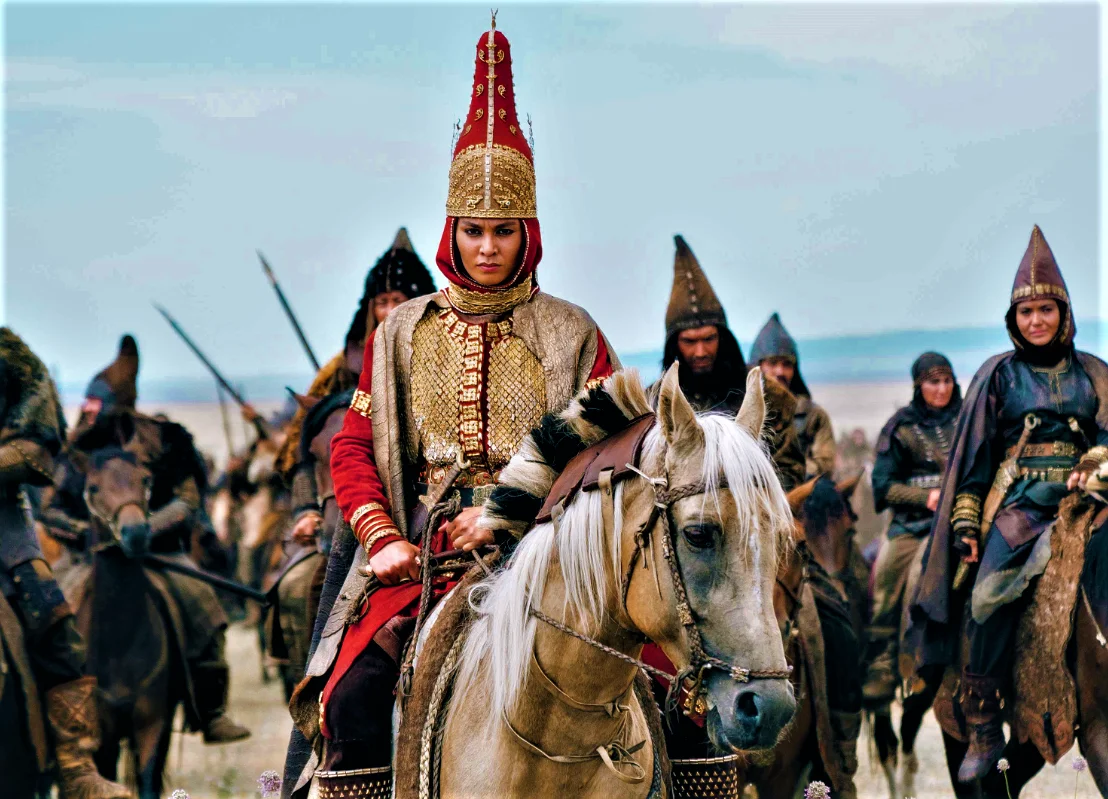
"Tomiris" (2019). Directed by Akan Satayev, "Kazakhfilm", Sataifilm
"The Tale of a Pink Bunny" (2010)
Directed by Farkhat Sharipov
Erlan, a provincial student, makes a living by wearing a pink fur bunny costume on the streets of Almaty. One day, his unusual job catches the attention of Loko, a wealthy and drunken playboy. Loko is tasked by his uncle, the notable Farkhat Abdraimov, to find someone willing to take the blame for a hit-and-run incident in exchange for a large sum of money. This sets in motion a series of events that intertwine the lives of these characters.
Within the comedic and crime-driven narrative, Farkhat Sharipov's debut film offers several nuanced and unexpected qualities. For instance, one could speculate that the concept of the pink hare anticipates the appearance of a furry mascot in the remarkable 2016 film "Toni Erdmann" by Maren Ade. The story takes unexpected turns, delving into various topics, such as the challenges faced by laborers from Seifullin Street.
Despite its elements of a crime comedy, the film also attempts to incorporate social satire. However, it does so alongside genre conventions and a quasi-fairytale texture, evident in the romantic subplot involving a character named Jackie, who embraces relationships without pretense.
While the plot twists might remind viewers of the Russian comedies of the 90s, such as "Mama Don’t Cry!" (where characters search for a sailor), in "The Tale of the Pink Hare," these twists fit smoothly into the early 2000s Almaty setting. Unlike some later films with similar themes where fate takes center stage, as seen in "Taraz," here it's still the god Kairos who decides—a master of fleeting moments of happiness.
Echoing the sentiments of the city's young generation, a character in the film remarks, "In Almaty, you have to breathe differently: take a deep breath, hold it, and exhale—most importantly, without any hurry. It's the essence of Asian philosophy, my friend."
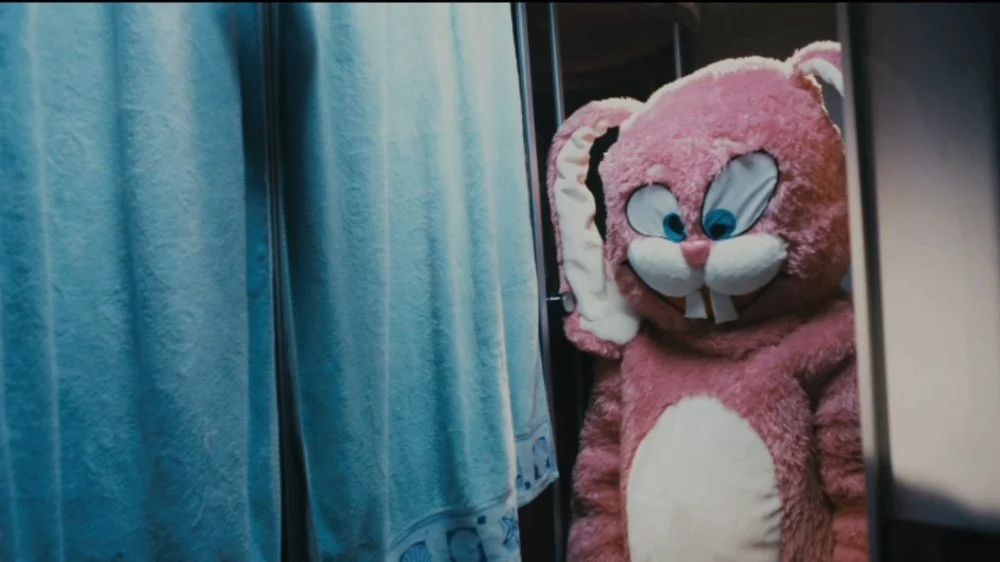
"Tale of Pink Hare" (2010) Directed by Farhat Sharipov, "Kazakhfilm", Altera Pars
"Happiness" (2022)
Director: Askar Uzabayev
The story revolves around a young and beautiful woman (Laura Myrzakhmetova) employed in a cosmetics company. She's preparing her pregnant daughter for a forced and joyless marriage, hoping that her husband (Erbolat Alkozh) will eventually grant her a divorce and free her from his clutches. Over the past five years, she has endured nine abortions solely because her husband desired a male child. In response, he not only drinks excessively but also subjects her to physical and emotional abuse. His incapability extends to intimacy, leaving her trapped in an unbearable situation. Even after surviving an attempted murder, he fails to die and becomes a life sentence of torment for her.
The theme of violence against women has appeared in various forms in Kazakh cinema before. For instance, a minor episode in "Chinara on the Rock" (1965) featured the line: "I didn't even get a chance to kiss her, and she reported me to the police!" However, "Happiness" doesn't merely touch on this issue—it brutally dissects Pandora's box. This film presents one of the most terrifying and brutal family dramas, not just in Kazakhstan but globally.
In comparison to other similar scenes in the film, even Gaspar Noé's "Irreversible," which two decades ago seemed the epitome of on-screen brutality, pales in comparison. References to Noé and other visionary filmmakers aren't just nods; "Happiness" is not only a social manifesto but also genuine, vibrant cinema. For instance, the impeccably shot wedding scene stands on par with Thomas Vinterberg's "The Celebration," the first film of the "Dogme 95" movement.
Besides explicitly masculine brutality rooted in tradition, "Happiness" also exposes the almost complete absence of female solidarity, save for a female lawyer. The daughter sides with her abusive father, the sister defends her abusive brother, and even the protagonist herself doesn't hesitate to marry her daughter off to a worthless abuser. Victim-blaming ("Once she becomes a daughter-in-law, she'll understand what I've been through") is widespread and unrelenting, like an ancient myth.
Perhaps even more impactful than the scenes involving a bloody hammer, the film's most potent element is the gaze of the heroine. Within it, one finds sorrow, hopelessness, emptiness, intellect, fury, pain, light, and occasionally vengeful satisfaction—elements that defy description. Everything is present in that gaze except one thing—happiness.

"Happiness" (2022). Directed by Askar Uzabayev
"Night God" (2017)
Director: Adilkhan Yerzhanov
The film's narrative unfolds in an "eternally concluding world" where quarantine and terror hold sway. The root cause of everything is encapsulated in the words, "The face of God appeared in the sky, my daughter burned, and I was powerless." A peculiar hallucinatory game ensues, alternating between an abandoned factory workshop and an ancient polis. The rules of this game dictate that no one has a home, and there's no hiding from anyone. Notably, the film was created long before the outbreak and conflict.
Adilkhan Yerzhanov is a frequent and prolific director, capable of transforming even the phrase "Notary" on a white wall (as in "The Yellow Cat") or a car parked before a barrier into cinematic art. "Night God" stands as his most fantastical and opulent work to date. Within his manifesto of partisan cinema, the technique of socialist realism plays a significant role. It could be said that "Night God" offers an intriguing example of socialist surrealist art.
Golden frog-like beings on thrones, a sky painted in crimson hues, sand flowing from a jug instead of water, people donning caps while nibbling on carrots as the clocks freeze – the oneiric realm of "Night God" is meticulously crafted down to the very last frame.
Here, the notion persists that "Even in hell, there is light; otherwise, there's nothing." Reinterpreting this sentiment in relation to the film itself, it's important to recognize that even amidst delirium, there is a sense of aesthetic. In his post-apocalyptic reveries, the accomplished Yerzhanov emphasizes the hypnotic intentionality of each image – for without it, there's nothing.
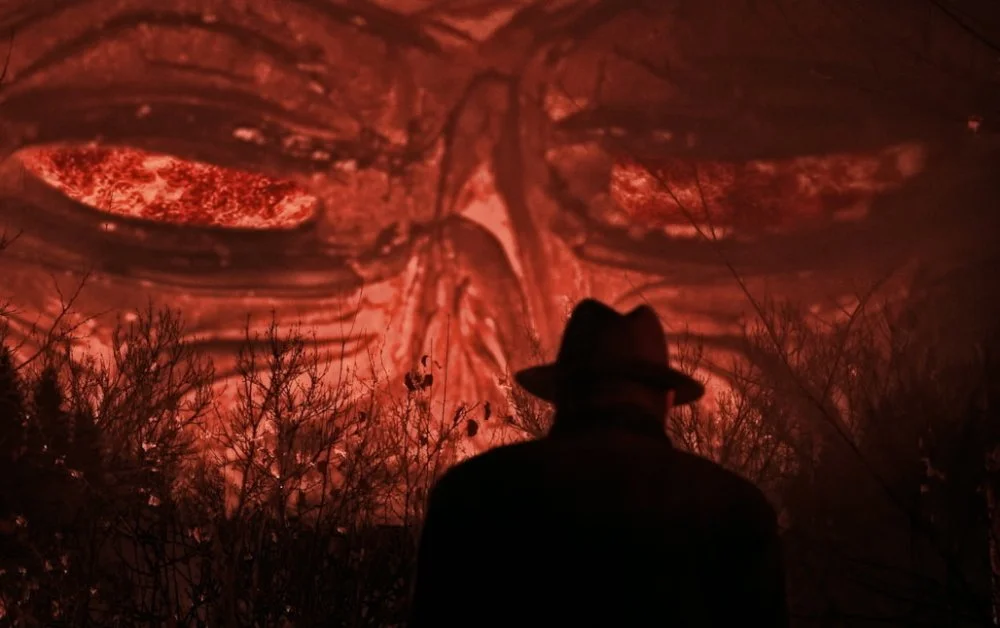
"Night God" (2017) Directed by Adilkhan Yerzhanov
"Summer Will End Soon" (2022)
Director: Yana Skopina
The setting is the summer of 1990 in Almaty. Baha (Alikhan Abildin), a schoolboy with a broken arm and a knack for writing, pens poems into a dictaphone ("At the cusp of graduation, yet sadly, you're not by my side"), dons a red hat reminiscent of Holden Caulfield, sways in a robe to the melodies of "Aquarium," and falls for Berta (Olga Obukhova), a girl playing a mermaid at a school event, who abides by the rule of "don't love anyone, and then you'll be everyone's favorite." This was how life was while Viktor Tsoi was alive.
Consider this a milder rendition of the profound "Districts" (2016) by Satpayev, differing in that it isn't about "upstanding lads" but more about "mischief-makers and devils." "Trans-Siberian Express" starts with an actual performance of the legendary band "Kino" in Almaty. With little time left for Tsoi, the sensation of his song's final days collides with the protagonist's waning childhood, morphing into what he dubs a "dream, from which I'll never wake."
The boy delving into hypnosis is a direct homage to Emir Kusturica's film "Do You Remember Dolly Bell?" (1981). In fact, this film subtly alludes to "The Balcony," featuring Stalinist garden orchestras and culminating in a scene of adolescent departure.
Video salons adorned with erotic posters, prom nights choreographed to Zhenya Belousov's tunes, farewells to military service soundtracked by "Bravo," Alan Chumak on television, and a Hendrix poster adorning the wall resembling a warrior in a yurt. The language in this film might well befit the depicted era, effectively encapsulating the ambiance of that time. "Summer Will End Soon" marks a debut film that emanates coziness. However, this cozy lamp shatters, leaving wounds that won't heal immediately. This cinematic tribute is undeniably dedicated to Sergey Solovyov. Who else could merit such an homage?
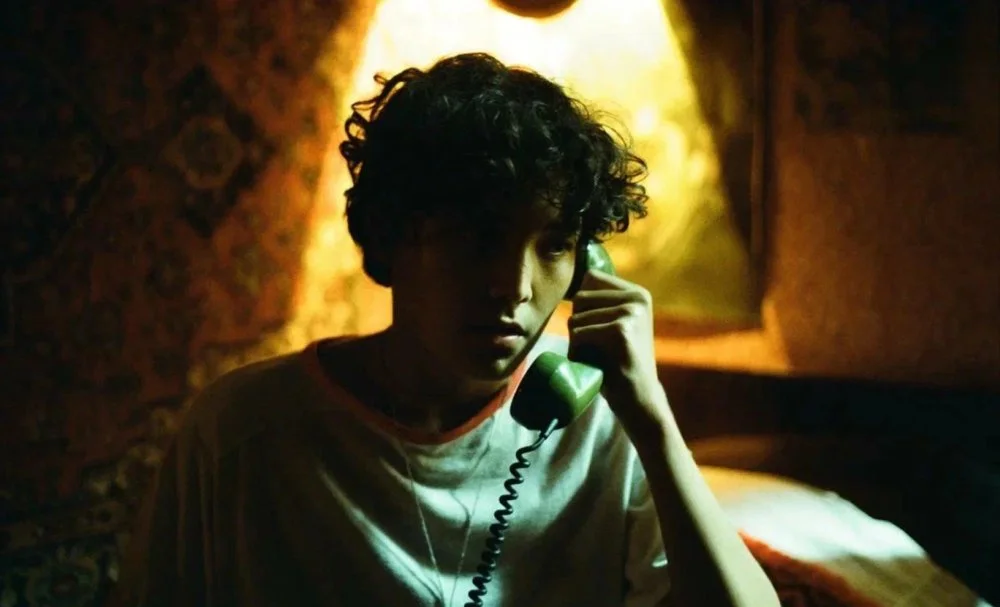
"Summer ends soon" (2022) Directed by Yana Skopina, Uvent Production, "Kinokult", Protalent
"Final Stop" (1989)
Director: Serik Aprymov
Erken (Sabit Kurmanbekov) returns home after completing his military service. In his absence, his native village, Aksaut, has transformed into a place of desolation and despair, depicted in sepia tones. Gray moments of intoxication and attempts at equally drab brawls now define the village. It's as if the refrain from the songs of that era echoes: "The metal house doesn't weep, though so many years have passed since its construction." Although the house isn't actually made of metal, but of adobe.
"Final Stop" certainly doesn't fall into the category of films that easily capture the audience's affection. Today, watching it demands a certain effort and commitment, yet it's indispensable for grasping the essence of the emerging new wave. It stands as a distinctly different aspect compared to "Needle," yet the very electricity that will define the future of Kazakh cinema seems to spark between these two works.
In her dissertation, Inna Smailova delved into the theme prevalent in Serik Aprymov's early films – the sensation of human redundancy within the confines of their homeland. It's worth adding that this sentiment of insignificance evolves into a sort of superposition, eventually yielding its rare fruits.
While "Final Stop" mainly features the sound of glasses clinking, reminiscent of fish, its sequel, "Aksuat," introduces a truly divine scene of swaddling a child.
As one of the pivotal inspirations behind the Kazakh New Wave, Robert Bresson, once aptly said, "Glances are the only thing that matters in a film." Even if someone is merely gazing at a kerosene lamp through an evening window, as depicted in Serik Aprymov's cinematography.
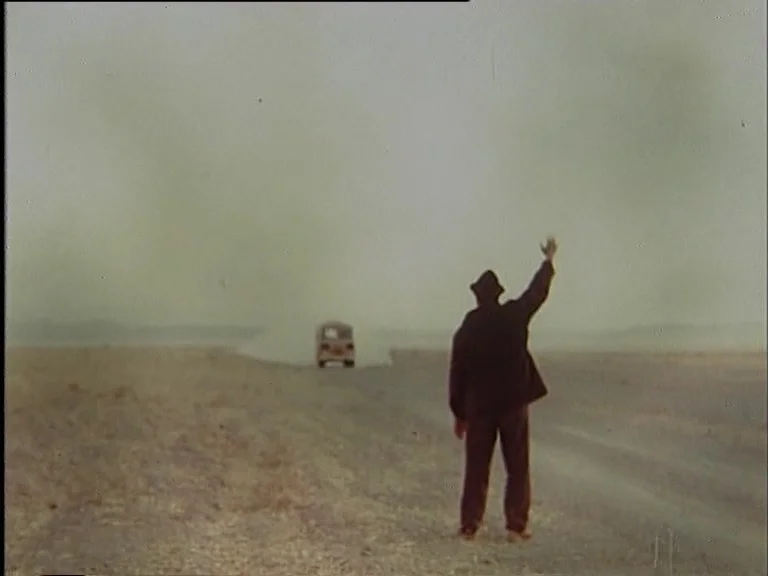
"The Last Stop" (1989). Director by Serik Aprimov, "Kazakhfilm"

"Transsiberian Express" (1977) Directed by Eldor Urazbayev, "Kazakhfilm"
"Tender Indifference of the World" (2018)
Director: Adilkhan Yerzhanov
Following her father's suicide, which left the family drowning in debt, Saltanat's (Dinara Baktybaeva) mother sends her from the village to the city to live with a certain Uncle Khaim – a move that's essentially a transaction. As Saltanat, dressed in red and carrying an umbrella, embarks on a journey toward her impending fate, she is followed by a devoted orphaned romantic named Kuandyk (Kuandyk Dussembaev) – an adherent of Albert Camus, a fighter and an artist who can soar on hand-drawn airplanes. Driven by a longing for love as profound as that depicted in French literature, Kuandyk is willing to betray and even kill for it.
The Kazakh New Wave has always been deeply cinephilic, but its dedicated follower, Yerzhanov, has shifted from subtle allusions to direct references. For instance, in this film, the owner of a vegetable market explicitly tells Kuandyk, "You work like Jean-Paul Belmondo, so fast, damn!"
One of the tenets of partisan cinema comes to life in this film, a manifesto that Yerzhanov penned in 2014. The idea is not only to show but also to articulate. "Tender Indifference of the World" draws inspiration not only from Camus and Belmondo. It features the characteristic motif of the railway, frequently seen in Kazakh cinema, and the lingering final shot of a casual conversation among policemen beside the lifeless bodies likely recalls a similar arrest scene from the film "The Pigeon Fancier" (1993).
Yerzhanov directs with extraordinary ease and sensitive clarity. All of his films are tightly woven, ideologically consistent (socio-realistic vocabulary suits him well), and devoid of unnecessary embellishments.
Given the director's affinity for references to the French (his "Yellow Cat" begins with a conversation about Jean-Pierre Melville's "Le Samouraï"), it's worth noting that Yerzhanov's method bears a resemblance to Claude Chabrol's. Chabrol believed that not every film needed to be a masterpiece and that it was better to release solid cinema annually than to wait a decade for a revelation. Likely, this approach will apply to all of Yerzhanov's films, at the very least to "Tender Indifference of the World."
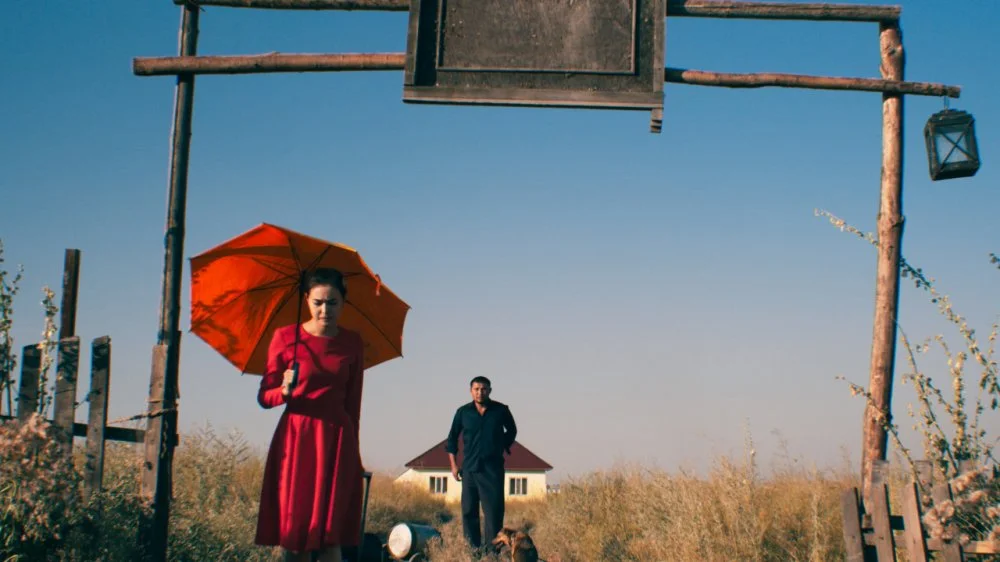
"The Gentle Indifference of the World" (2018) Directed by Adilkhan Yerzhanov, Cirko Film
“Qash" (2022)
Director: Aysultan Seitov
Set in the 1930s, "Qash" follows the story of Isatai (Erkebulan Daiyrov), a gravedigger in a Kazakh village who daily disposes of the bodies of those who died from starvation. After his father's suicide, leaving the family burdened with debts, Isatai's mother sends her daughter Saltanat (Dinara Baktybaeva) to the city of Sarkand, effectively to be sold, along with Isatai's eight-year-old brother Alim (Sultan Nurmuha) and the Red Army soldier Ilya (Alexander Pal).
A mystic encounter occurs when an old man with a cataract in his eye (Ondasyn Besikbasov) appears during the night, playing the shankobyz. This meeting marks a turning point for them, propelling them forward as if they were cosmonauts exploring an alien planet.
This film is atmospheric and, at times, breathtaking in its beauty. Its horror doesn't rely on special effects or emotions but rather on the very essence of the space it portrays. While there's a literal nod to the Japanese film "The Ring," where a deceased girl emerges from a trunk, resembling the image from a television, this serves more as an exception and an attraction reminiscent of the spirit of Zheztyrnak. Only the boundless steppe is granted the privilege of instilling fear, where a yurt replaces the typical black wigwam, and hunger becomes the most potent poison.
Hunger guides them across the vast expanse of space, leading to a different realm. Here, the deceased awaken, and snow descends like lime into a grave.
The film's soundtrack begins in the lush folk style of Matt Elliott. As the narrative unfolds, the music evolves into shamanic electronic melodies before eventually settling into the solitary resonance of the shankobyz in the darkness.
"Qash" powerfully illustrates Blaise Pascal's notion that there is nothing more horrifying than the silence of infinite spaces.
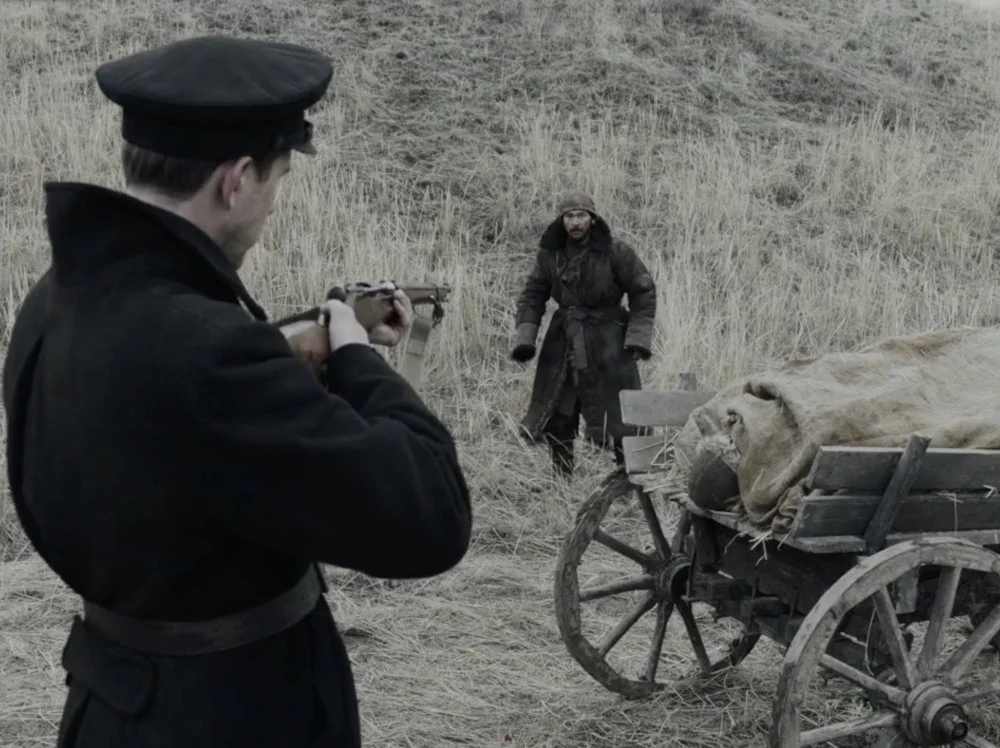
"Kash" (2022) Directed by Aisultan Seitov, Qara Studio
"The Student" (2012)
Director: Darezhan Omirbayev
The protagonist, a student named Nurlan Baitasov, wanders through the city with a fixed but intense gaze, donning a hoodie adorned with a pacifist symbol. He attends lectures on contemporary capitalism, where he imbibes the notion that in the battle of life, the strongest prevail. When confronted with the issue of paying rent, he exchanges a family heirloom for a pistol with three bullets and uses it to commit a murder in a store, targeting both a greedy shopkeeper and an inadvertent shopper.
This film takes loose inspiration from Dostoevsky's "Crime and Punishment." While echoes of Marmeladov holding a beer and a character akin to Sonya can be discerned, Investigator Porfiry Petrovich and Svidrigailov are conspicuously absent. Instead of Christ, Laozi's philosophy resonates, highlighting that wealth rarely accompanies honesty, and true honesty seldom leads to riches. The student is confronted with the assertion that Protestantism doesn't align with Kazakhstan's ethos, not just culturally but even climatically, reflecting the nuanced local attitude towards wealth.
Omirbayev, often heralded as the Kazakh Bresson, delivers an unsettling scene reminiscent of the donkey's demise in Bresson's iconic "Au Hasard Balthazar." "The Student" commences with a scene of a film shoot on Panfilov Street, where Omirbayev takes on the role of the director—a technique departing from Bresson's style yet evocative of Jean-Luc Godard's approach (who, incidentally, holds a strong affinity for Omirbayev's creations). An actress unintentionally spills hot tea on herself, leading her to summon bodyguards in a black jeep, who subsequently dole out severe punishment to the transgressor. Omirbayev confirmed in one of his film analysis columns that this incident was indeed a real occurrence.
In its own manner, "The Student" unfolds Dostoevsky's eloquence into silent reality, encapsulating the feeling of being ensconced within the gray confines of the world, where the resonance of footsteps eclipses the significance of spoken words.

"Student" (2012) Directed by Darezhan Omirbayev, "Kazakhfilm"
"Tulpan" (2008)
Director: Sergey Dvortsevoy
Asa (played by Asa Yeskembiyev) returns to his native lands in the steppe of Betpak-Dala, located 500 km from the city, after serving in the Pacific Fleet. His dream is to become a shepherd and create a "paradise corner beneath the starry Kazakh steppe sky." The storyline closely resembles that of late American westerns. However, to acquire a sheep flock, he must first start a family—this is a condition imposed by his superiors. Among the potential brides in the region, the only candidate is Tulpan, who lives in seclusion and is almost a day's journey away.
Throughout the film, the song "Rivers of Babylon" is repeatedly heard—a well-known cover by Boney M of the Rastafarian song by the group Melodians, which itself draws inspiration from biblical psalms. Rastafarians liken themselves to the people of Israel in exile, with Babylon symbolizing all the constraints of imposed state control.
This serves as a subtle musical satire of the protagonist, who, as a sailor and traveler, shares stories of sea creatures and adventures. He occasionally attempts to escape to the city (resembling Babylon), yet he always returns to the steppe, to his unattainable Tulpan (who, curiously, seems reminiscent of Babylon too). How can he return home when he's already there?
The essence perhaps lies in the notion that everything in this world is akin to Babylon, except for the natural elements. In "Tulpan," the people appear as secondary bystanders in the profound earthly processes, before which the camera trembles as if in the wind. It's the birth and death of a lamb in the steppe, the illness of a young camel separated from its mother, the white puppy under stormy skies. Arguably, one of the longest and most magnificent shots of a sheep flock's journey in cinematic history is captured here, rivaled only by something similar in "Chinar on the Cliff" by Sultan-Akhmet Khodzhikov (1965).
The film won the Grand Prix in the "Un Certain Regard" category at the 2008 Cannes Film Festival. Ten years later, director Sergey Dvortsevoy would be nominated for the Palme d'Or for his film "Ayka," centered around Kyrgyz migrants in Babylon—i.e., Moscow.
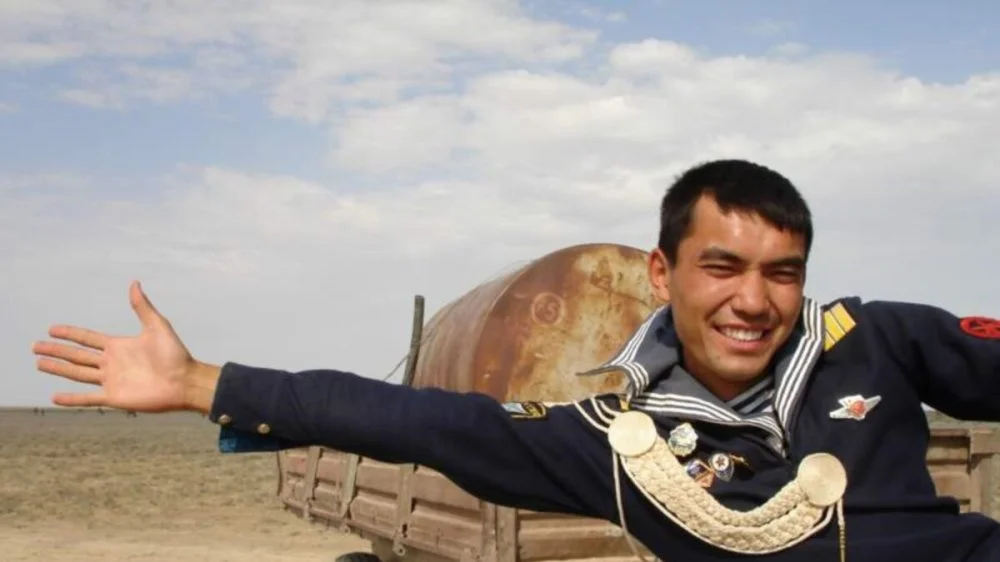
"Tulpan" (2008) Directed by Sergey Dvortsevoy, Zeitgeist Films
"Swift" (2007)
Director: Abay Kulbayev
High school student Aynur, nicknamed Swift (played by Inessa Kislava), quits school, leaves her home, and spends nights in sheds alongside migrant workers. Her stepfather drinks every day, her mother is pregnant, and everyone around labels Swift as a thief, a drug addict, or a tomboy (with a lesbian undertone), although she is none of these. She is simply an unattached gentle force that cannot be broken by solitude, assault, or an approaching car.
The plot might seem challenging to digest, but beneath the surface of communal quasi-social life lies a delicate lyrical film. The focus is on capturing her actions: doing her nails on a wounded hand, sipping champagne from the bottleneck, or running out uncut (hence the nickname) from the hair salon. The shorn Aynur bears a faint resemblance to the heroine of Solovyov's "Straightforward Heiress," yet in a much more streetwise and angular form. The scene where she lies about her mother's death is, of course, a nod to François Truffaut's "The 400 Blows." In other words, "Swift" is a continuation of that profoundly poetic cinematic tradition in which the inner world of fledglings takes precedence over the shell of circumstances.
The girl lives beneath the cable car on Kok-Tyube Hill, but she has never ridden it. When the chance finally comes for her to see the city from above, it becomes her four hundred and first blow.
Abay Kulbayev, the director of the brilliant and unique "Swift," recently announced his departure from the film industry after an involuntary sixteen-year hiatus.
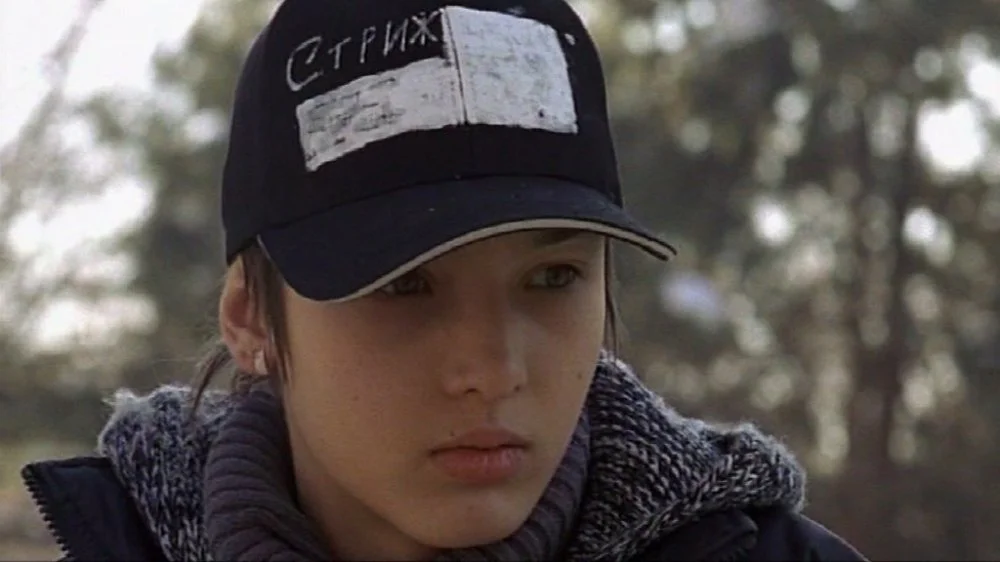
"Strizh" (2007) Directed by Abai Kulbayev, "Kazakhfilm"
"The Rejected" (2018)
Director: Zhanna Isabaeva
A young woman named Aiganym (played by Zhanargul Zhaniamanova) returns to her native village from the city, accompanied by her young son Timur (Esim Turarbek). She seeks forgiveness from her mother and brother by the fence for bringing shame onto the family. Her guilt stems from the fact that the father of her child, who initially intended to marry her, has changed his mind. Her family first drives her away, then proceeds to brutally beat her, repeating this violence until her eventual death. Despite this, she remains unforgiven.
A recurring theme in Kazakh cinema involves individuals from rural areas moving to the city and confronting a range of problems, from economic struggles to existential crises. In "The Rejected," the scenario is reversed: it's not the city that inflicts harm, but her own homeland with its unyielding southern traditions.
The film radiates a self-contained intensity reminiscent of the style of Lars von Trier, complemented by the musical backdrop of Omnibus Ensemble. This musical choice evokes memories of Max Richter's soundtracks. The film delves into the lives of miserable individuals who exist beneath a metaphorical cap, where wages go unpaid for months, the police are deeply corrupt, and a single woman is often unjustly labeled promiscuous. As articulated by a local woman, "Have we forgotten where live?"
However, the sense of community remains strong, and as explicitly highlighted in "The Rejected," they "don't abandon their own." Aiganym's brother (Nysanbek Zhubanaev) takes in and endeavors to shape her orphaned son into a "real man" despite his circumstances. This young boy, clutching a boiled egg in his hand, embodies both sadness and hunger. Notably, a prevailing motif in films of the 2010s is the silence of children (similarly depicted in "Táu"), akin to the silence of God.
The film's protagonist lacks personal agency, with little known about her apart from her cherished memories of a spot beneath a tree by the river from her childhood. In a poignant scene, she attempts to swim upstream, symbolizing her resistance against the prevailing currents of life. Yet, in the rivers of this world, the remains of an enemy may one day float by unnoticed. Thus, life continues its course, and yet fundamental change remains elusive.
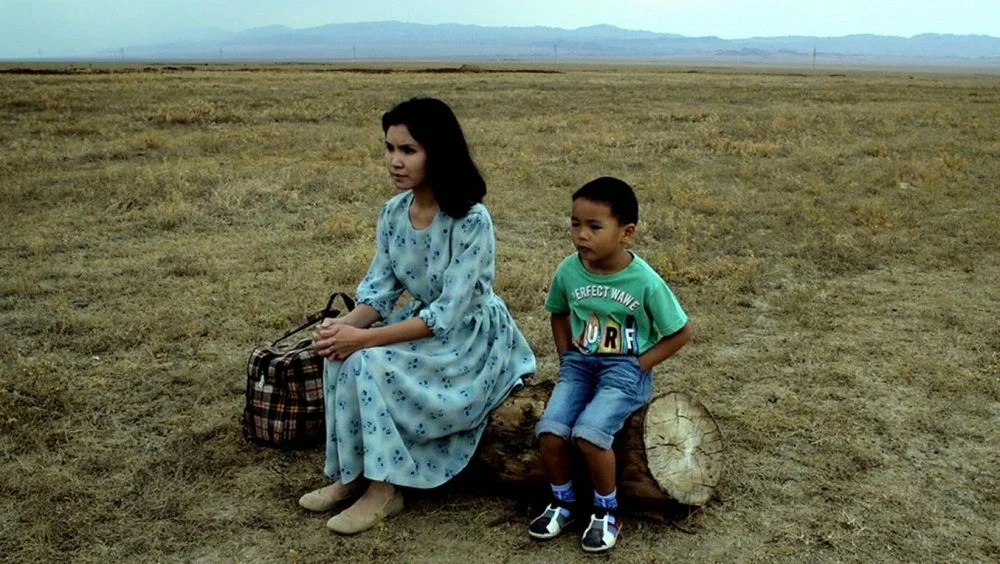
"Rejected" (2018) Directed by Zhanna Isabayeva, Sun Production
"The Fall of Otrar" (1991)
Director: Ardak Amirkulov
The year is 1218. Unju, a Kipchak warrior (portrayed by Dohdurbek Kydyraliev), known as the arrow of Allah, returns to Khwarezm after seven years of espionage in Genghis Khan's armies (Bolot Beyshenaliev). His mission is to warn of the impending Mongol invasion. A familiar phrase echoes: "Who needs land without the Kipchaks?" However, Khwarezmshah Muhammad (Abshurashid Maksudov) kills Genghis Khan's envoy-merchants, sealing the fate of Otrar, a city he controls in the Southern Kazakhstan region.
Renowned critic Kent Jones once described this film as a "lavish celebration of medieval obsession, painted in sepia tones." Indeed, an atmosphere of obsession permeates the entire movie – from the despair of Unju, a warrior-prophet who places his face in the flames, to the downfall of a once-mighty empire ("the sleeping one remains oblivious to its own demise").
Recreating the ancient world without relying on computer-generated imagery, the film achieves hyper-realism in all aspects: horsemen patrol dark alleyways with torches, and a frail, partially blind queen secretly observes young lovers and martyrs covered in flies hang from crosses in the executioner's tower.
The script for "The Fall of Otrar" was crafted by Alexey German and Svetlana Karmalita. In this narrative, the question of what it's like to be a god begins to emerge. Ardak Amirkulov's film carries a secondary title – "The Shadow of the Conqueror." The narrative's trajectory leads unwaveringly towards the yellow-eyed Genghis Khan, whose shadow (or presence) casts an ominous cloud over the world. His invasion is akin to an elemental force – he identifies himself as the wind of wrath, and his initial appearance is seen as a reflection in a water bowl. Genghis Khan seeks out those who "live forever," and, as Amirkulov conveys, his mission serves a purifying purpose – to trample the land beneath his horses' hooves, clearing the path for something new to grow.
Interestingly, the actor who portrays Genghis Khan, Bolot Beyshenaliev, also played the Tatar Khan in "Andrei Rublev." In "The Fall of Otrar," the same grim execution is depicted as in Tarkovsky's film. However, here, molten silver, not tar, is poured into the eyes and throat.
The ancient Otrar serves as the destination of the hero-archaeologist from Yuri Dombrovsky's "The Faculty of Useless Things," who seeks a mythical library. Today, the film "The Fall of Otrar" finds its place in Martin Scorsese's library.
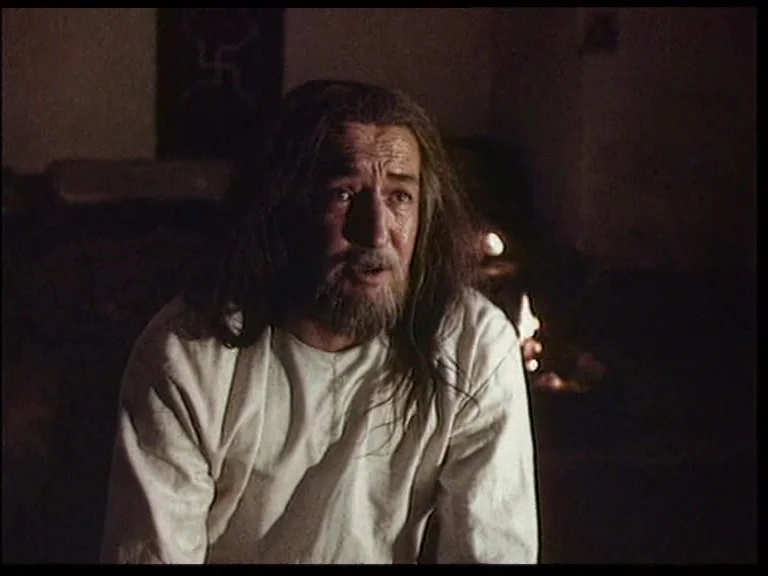
"The Death of Otrar" (1991) Directed by Ardak Amirkulov, "Kazakhfilm"
The Old Man "Shal" (2012)
Director: Ermek Tursunov
Kasym, a seventy-three-year-old man with a history as a notorious sheep thief, now spends his time watching "Mrs. Robinson" on television and nurturing dreams of sending his grandson to Yale University.
During a sheep drive, Kasym's path is diverted by thick fog. Forced to spend the night in the steppe, he faces a pack of wolves armed only with an axe. These wolves had been disturbed the previous day by hunters in a Hummer. However, in this story, the human element takes a backseat as the narrative primarily revolves around a she-wolf, a lamb, and even a mouse to some extent.
"Shal" is a compelling adaptation of Hemingway's "The Old Man and the Sea." In this rendition, the vast sea transforms into the sprawling steppe, and the formidable sharks are replaced by wolves. Hemingway’s old man had an affinity for baseball, while here we see Kasym naming the sheep after Brazilian football players, adding a unique Kazakh twist.
Yet, the director's homage isn't just to American literature; it resonates strongly with biblical undertones. Kasym can be seen as a modern-day Moses, navigating through the foggy steppe among the lambs, seeking his version of the promised land. His journey is akin to a confrontation with a higher power, a God who confounds his path, leading him in circles, prompting Kasym to question, "What are you doing to me? I never believed in you. Is this how you punish for not believing? I've never even been to a mosque... My God is this steppe."
Unmistakably, there are echoes of Aimanov's timeless film "Land of the Fathers" in the storyline, providing a rich layer of connection and depth.

"The old man" (2012). Director: Yermek Tursunov, "Kazakhfilm"
"Kairat" (1991)
Director: Darezhan Omirbaev
A young man named Kairat (played by Kairat Makhmetov) arrives in Almaty from Petropavlovsk and settles into a dormitory. He attends driving school, experiences an unsuccessful romance, and has strange dreams.
In her May lecture titled "Almaty as a Trigger," Gulnara Abikeeva specifically noted that within the post-Soviet cinematic context, the city primarily symbolizes various degrees of traumatic experiences. In "Kairat," which was awarded the "Silver Leopard" at the Locarno Film Festival, this trauma isn't directly explored; rather, it simmers beneath the surface, finding solace in dreams as a form of protective inhibition. Kairat's dreams are filled with empty train station platforms. It's worth recalling that Freud himself considered train journeys to be dreams symbolizing death.
Despite the film's production in 1991, there are minimal indicators of that specific time period, except for a poster of Samantha Fox adorning the closet door. The atmosphere evokes a sense closer to 1971 or even earlier, especially with the presence of a "Pobeda" car from 1933, which intensifies the feeling of timelessness.
Among Kazakh directors, Omirbaev was the first to truly grasp the essence of minimalism. Adilkhan Yerzhanov, one of his most talented followers, has pointed this out. Overthinking is balanced by simple yet evocative imagery: snow falls, an alarm clock ticks, a television plays amid heavy rain, and a dove perches on an open train compartment window – all interconnected in intricate ways. As a French saying goes, as long as you're alive, life doesn't hold any adventures.
In an interview, Omirbaev shared that during an exam scene, he ritualistically hung portraits of Antonioni, Godard, and Bresson in the classroom, replacing the mathematicians. While few might notice them, their presence is palpable. It's as if these portraits never leave the film's frame, even for a moment.

"Kairat" (1991) Directed By Darizhan Omirbayev, "Kazakhfilm"
"Racketeer" (2007)
Director: Akan Satayev
Sayan Bekkarimov (portrayed by Sayat Isembayev), born in 1970 in Almaty, is a tenacious product of his time, marked by significant milestones – an F on his school report card, boxing at the age of 12, brawls at the Old Square, military service, and a godfather resembling a gangster-hero (Murat Bisembin). His path also involves racketeering, protection services, business ventures, and adhering to a samurai-like code of honor, which ultimately culminates in an inevitable conclusion.
American researcher of Kazakh cinema, Peter Rollberg, lauded "Racketeer" as a "masterpiece of cinematic storytelling and an endlessly captivating thriller about the country's immersion into post-capitalist reality."
The film, infused with crime yet also sentiment, holds a significant place for various reasons. Firstly, it symbolizes the revival of the film industry in the 2000s, considering that no films were produced in Kazakhstan in 2000. Secondly, it intriguingly transforms the Soviet tradition of sports films, especially those centered around boxing, such as Sharip Beysembayev's "White Square" (1971). Thirdly, "Racketeer" strikes a harmonious balance, avoiding excess. On-screen violence is presented judiciously, and the audience's sympathy towards the characters is measured but impactful. The underlying philosophy is succinctly conveyed through a parable-like insertion that illustrates how the cup of injustice for every individual eventually overflows.
While some have drawn comparisons between this film and Darzhan Omirbayev's "Killer" (1997), "Racketeer" rather exudes a rhythm akin to the finest works of Takashi Kitano – dynamic yet fluid. Notably, the soundtrack features My Bloody Valentine alongside "Vladimir Central," serving as a subtle and unconventional reminder of the 90s era.

"Racketeer" (2007) Directed by Akan Sataev, Sataifilm
"Leila's Prayer" (2002)
Director: Satybaldy Nyrambetov
After her father's death, the beautiful wild girl Leila (Ayan Esmagambetova) is taken in by her father’s younger, alcoholic sister (Natalya Arinbasarova). It's believed that Leila possesses the evil eye – a gaze that can break the string of a kobyz, a traditional Kazakh musical instrument. They reside in the Semipalatinsk region, in the village of Degelen, where sheep graze on poppy fields, people suffer from brucellosis, and the military force-feed the locals with strange medicines that give them headaches. By the beginning of the 1960s, nearly 500 nuclear explosions had taken place here as part of nuclear testing.
"In all our films, we depict the coming of age of men, but we've seldom featured girls in our cinema," director Sharipa Uzarbayeva recently lamented in a television program. However, this isn't entirely accurate. The somewhat forgotten "Leila's Prayer," even if it stands alone, is worth a dozen films.
On one hand, it presents itself as a classic retro elegy with disabled, characters singing Robertino Loretti, the launch of Yuri Gagarin, and reminiscences of Raj Kapoor's film "Shree 420." Simultaneously, it exudes an unsettling, radioactive aura where birds fly into rooms through shattered windows, women burn alive on power lines, and Leila herself emerges as a Madonna figure with a child against the backdrop of a nuclear mushroom cloud.
In "Leila's Prayer," Dulyga Akmolda makes what is arguably her first on-screen appearance. She would later become a star in contemporary hits like "Personal Growth Training."

"Leila's Prayer" (2002) Directed by Satybaldy Narymbetov
"Harmony Lessons" (2013)
Director: Emir Baigazin
During a medical examination at a rural school, a humiliating incident occurs with Aslan (Timur Aidarbekov), a silent autistic boy with a talent for physics. Following this, his classmates begin to subject him to relentless bullying, akin to prison dynamics. However, Aslan, with his surprising ability to skillfully butcher sheep, unexpectedly proves to be far from powerless in this situation.
This school bullying drama, with its extended, contemplative shots, a silent protagonist, and a thoughtfully woven narrative, made its way into the main competition at the 2013 Berlinale, where cinematographer Aziz Zhambakiyev rightly earned the "Silver Bear." The detached precision of the camera work provides a striking contrast to the turmoil brewing within. Overturned chairs in an empty classroom serve as a powerful visual symbol of a disrupted childhood, where kids strive to behave like prisoners and ultimately end up in jail.
In one lesson, Aslan learns about how organisms fight for survival (similar to the way Omirbaev's "Student" explores animal capitalism). Essentially, Aslan, with his lizards in a jar and bats in his belfry, is essentially in search of harmony within the order of the world – he refrains from killing but tests conditioned reflexes. However, the pursuit of purity is now intertwined with the persistent trigger of a tainted glass. Within the framework of the proposed fight for survival, a transition from reflexes to instincts becomes necessary.
Emotions disrupt harmony, so the film deliberately avoids music or other cathartic manipulations. At the beginning of this movie, a sheep is meticulously slaughtered, only to be resurrected lightning-fast at the end, alongside other with others that were killed - for harmony lies in the fact that all its natural components exist on equal terms.

"Harmony Lessons" (2013) Directed by Emir Baigazin, "Kazakhfilm", FD Film Distributions
"Sunny Days" (2011)
Director: Nariman Turebayev
The protagonist of the film, Erlan Utepbegenov, is a 29-year-old urban underachiever who faces the looming threat of eviction due to unpaid rent for his apartment. His diet consists of instant ramen noodles, he tries to imitate capoeira moves, frequents the same pub, and repeatedly finds himself entangled in a series of unfortunate mishaps. Set against the backdrop of February in Almaty, the protagonist marks the passing days using a tear-off calendar.
"Sunny Days" carries forward the essence of the new Kazakh wave, showcasing the adventures of young individuals, or perhaps even young swans, especially considering the film's concluding scenes. It bears a resemblance to Erzhan Shinarbayev's "Place on the Grey Triangle" (1993). Significantly, "Sunny Days" also garnered recognition at Locarno. The title, derived from a song by Viktor Tsoi, plays a thematic role as the protagonist struggles to play it on the guitar, alluding to the cinema of the perestroika and post-perestroika eras (even his friend bears a resemblance to Bazin from "Courier").
We are given scant information about the protagonist, except that he is 29 years old and can drive a car. His sense of agency is absent, or rather, it is largely driven by sexual ambitions projected onto him. He is essentially a vague object of desire: everyone wants him, from the neighbor pianist and shopkeeper to his comrade's wife and maternal friends.
As for him, it appears he desires nothing. In reality, it's not just his apartment that is being taken away; it's him being taken away from it due to redundancy. The physiological authenticity of his internal state is brilliantly unveiled through a succession of inanimate objects: an iron he attempts to sell at a flea market, an orange crushed on the February ice, a crumpled toothpaste tube, a portrait of a young Mickey Rourke above the bed, a doll with large eyes buried in the snow, and several other items he will no longer encounter.

"Sunny Days" (2011) Directed by Nariman Turebaev, "Kazakhfilm"
"Dos-Mukasan" (2021)
Director: Aydin Sahaman
This biopic cleverly weaves together the conventions of a rock biography with the texture of a Soviet industrial film, showcasing the story of the immensely popular Kazakh VIA (vocal-instrumental ensemble). Magomaev's songs and The Beatles' tunes hum in the backdrop of a construction brigade bus while rehearsals take place beneath the watchful gazes of Marx and Engels' portraits. The narrative unfolds to reveal an all-Union competition in Minsk and fleeting encounters with figures like Kunayev, Mulyavin, and Pakhmutova, all painting the picture of an arduous journey towards freedom.
The title "Dos-Mukasan" serves as an acronym of the ensemble members' names, reminiscent of the style of Crosby, Stills, Nash & Young. Yet, in stark contrast to the American ensemble's perennial conflicts, "Dos-Mukasan," as depicted in the film, embodies a model of musical and human brotherhood. As the movie echoes, when asked, "Is he your brother?" the response is, "We are all brothers."
While the film's creators acknowledge the influence of "Bohemian Rhapsody," the parallels extend further, aligning with the contemporaneous series "Danny Boyle's Sex Pistols." This resemblance comes to life in a scene where "Dos-Mukasan" members craft a song within the confines of a monkey enclosure, a result of their earlier altercation.
However, these correlations with Western rock aesthetics are just the tip of the iceberg, as both style and real-life circumstances diverge. Polytechnic students find themselves juggling between their passion for rock music and their academic endeavors in metal production. A poignant irony emerges when the main conflict doesn't stem from censorship or an ambition fueled by substances, which often characterizes Western rock, but rather, it arises due to one founder's aspirations for postgraduate studies and a future Moscow career, jeopardizing the cohesion of the ensemble. Broadly speaking, the film captures the aura and lifestyle of a specific era, defying conventional norms and ultimately contributing to the creation of remarkable musical art. Ushanka hats, committee decisions, parental admonitions, allegations of smuggling, repertoire debates, and the ever-watchful eyes of the authorities all factor in, highlighting that creating rock music in such an environment is far more extraordinary than the clichéd realm of sex, drugs & rock'n'roll.

"Dos Mukasan" (2021) Directed by Aydin Sahaman, AMG Aray Media Group, KazakhCinema National Cinema Support Center
"A Purely Kazakh Story" (2001)
Director: Damir Manabay
In "A Pure Kazakh Story," we follow the journey of Temirzhan, a young boy whose father tragically passes away from a heart attack. Meanwhile, his uncle Tuak (Aldabek Shalbaev), recently released from prison, returns to their village. Upon closer inspection, it is revealed that Tuak is actually Temirzhan's biological father, though his behavior is far from paternal. Discovering the truth about his real parentage and the long-lost death of his mother, Temirzhan flees his home, seeking solace near the cemetery, reminiscent of themes in the film "Fierce."
Desiring to escape the cycle of mutual curses and the predestined fate that even Temirzhan's grandfather Omirbay (Asanal Ashimov) claims is inescapable, Temirzhan embarks on a profound journey. The film commences with an enigmatic call from a mystical stranger, evoking echoes of David Lynch's "Lost Highway" era. The souls of the departed transform into birds, symbolizing their presence as pigeons perch on Tuak's corpse, tapping on the window. As the story unfolds, Temirzhan receives a call from his brother, also released from prison, further propelling the narrative.
Notably, in the early 1990s, director Damir Manabay adapted Smagul Yelubaev's groundbreaking novel "The Lonely Yurt," which illuminated the Holodomor tragedy. While "Angel of Death in Surzhekee" and "A Pure Kazakh Story" significantly differ in plot and scale, they share a thematic link. Both films explore the deep-rooted divisions and emotional wounds caused by discord. The former encompasses a nation, while the latter focuses on the struggles within an individual family, characterized by references to the harsh historical realities of German and Soviet camps.
The portrayal of the wise and reticent patriarch Asanal Ashimov, distinguished by his gray beard and hat, bears a striking resemblance to Orson Welles during his later years. He imparts valuable advice on breaking free from the familial curse: "One must learn to forgive." Through the lens of "A Pure Kazakh Story," we witness the profound impact of forgiveness as a means of liberation from the burdens of the past.

"Purely Kazakh Story" (2001) Directed by Damir Manabai, "Kazakhfilm".
"Stranger" (1993)
Director: Timur Suleimenov
A semi-criminal ruffian named Nurlan (Kanat Esentayev) is dramatically stabbed to death on a pier - for his association with gangster Said's wife and other missteps. However, he comes back to life to spend another adventurous day in this world alongside an American forensic pathologist (Jonathan Goldstein). They plan to rob a convenience store, knock down a cyclist, and seek revenge on the killers. Interpretations of the plot may vary; maybe his lifeless body is possessed by Said’s son, a young artist boy, or maybe the key to everything lies in Nurlan's words: "In these times, everything is real."
This remarkable and lesser-known mystical thriller begins with a snow-covered alley, resembling a sequel to "The Needle," employing different means, including firearms, in addition to cold weapons. A connection to "The Needle" is evoked by the rope-tied bottle of beer, akin to Tsoi's coin on a string. In essence, "Stranger" is arguably the swan song of the Kazakh New Wave. Its rebellious spirit is pervasive; besides "The Needle," there are clear references to "The Fall of Otrar" with its spectral aquariums, enigmatic characters in gray coats, and twilight beauties. Even the classic of the wave, Darezhan Omirbayev, plays the role of a mafia bartender.
As one of the characters is American, the soundtrack takes on a distinct American essence. Kuat Shildibayev's excellent minimalist music echoes Morton Feldman's style, while the film's central theme is the unconventional blues of The Doors.
Within the film, two framed paintings appear a portrait of Dzerzhinsky and Munch's "The Scream." In a sense, these paintings embody the aesthetic formula of "Stranger." It represents a post-Soviet realm, finally ignited by the flames of expressionism, where vodka bought with ration coupons is consumed from teacups, dreams of escaping to China are nurtured, a girl in a golden skirt reads "The Twelve Chairs," and the knife only cuts from within the body.
"Taraz" (2016)
Directed by Nurtas Adambay
In a nightclub in Taraz, three friends find themselves at the center of an accidental shooting due to a random altercation over a girl. The victim happens to be the son of a criminal authority, adding to the gravity of the situation. Sapar (Erkebulan Daiyrov), an ill-fated boxer and a struggling father, proposes that the group flee Taraz for Almaty, inadvertently taking some hostages along.
Undoubtedly paying homage to "Boomer," the film contains almost literal quotes and shares a similar structure of flashbacks. However, the role of the "boomer" is substituted here by a battered Mercedes turned into a taxi. While "Boomer," when contrasted with "Taraz," might seem like a charmingly roguish comedy that warranted and received a sequel, the latter could never inherently have one. Adambay's film concludes with a definitive punctuation mark on all characters and their aspirations, offering them no prospects or alternatives. On this fatal trajectory, all that remains are desolate stares through windshields and death, the pinnacle of chance.
Despite its somber essence, the film exudes profound allure, etching memories like the mist-laden gas station or the gunshot sound resonating against a breathtaking landscape. This sense of melancholic beauty harmonizes seamlessly with Moldanazar's final song, "Sagym," evoking the spirit reminiscent of James Blake. This tender indifference to the world, a theme skillfully explored by other Kazakh filmmakers who have drawn inspiration from Albert Camus, finds its resonance within the film.
The first part of our list of the best Kazakh films can be read here.
